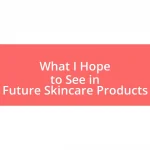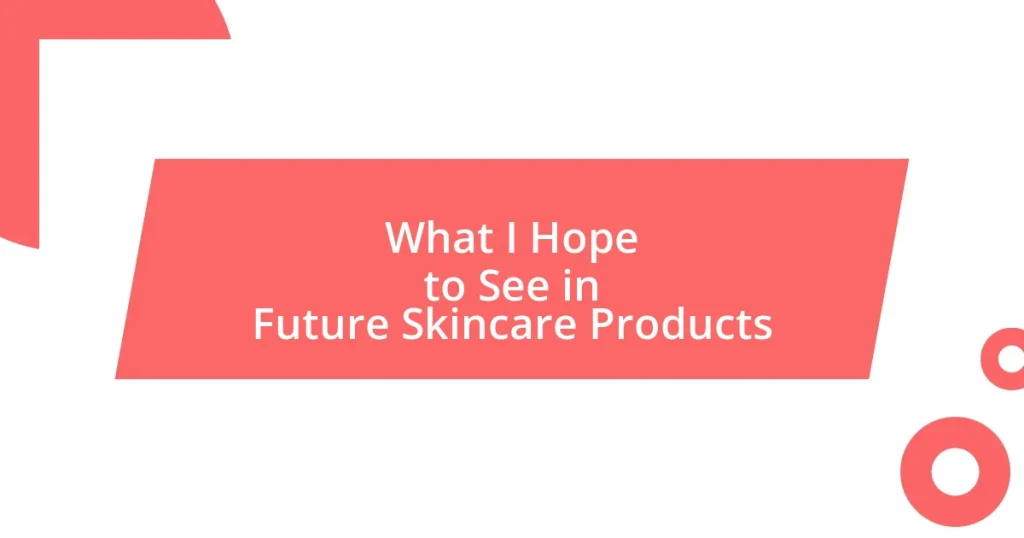Key takeaways:
- The future of skincare may involve lab-grown ingredients, adaptogens, and ferments, enhancing personalization and efficacy.
- Personalized skincare solutions using DNA analysis and AI-driven consultations could revolutionize beauty routines, offering tailored products that adapt to individual needs.
- Eco-friendly packaging innovations, such as biodegradable materials and recycling practices, are essential for sustainable skincare, resonating with consumer values.
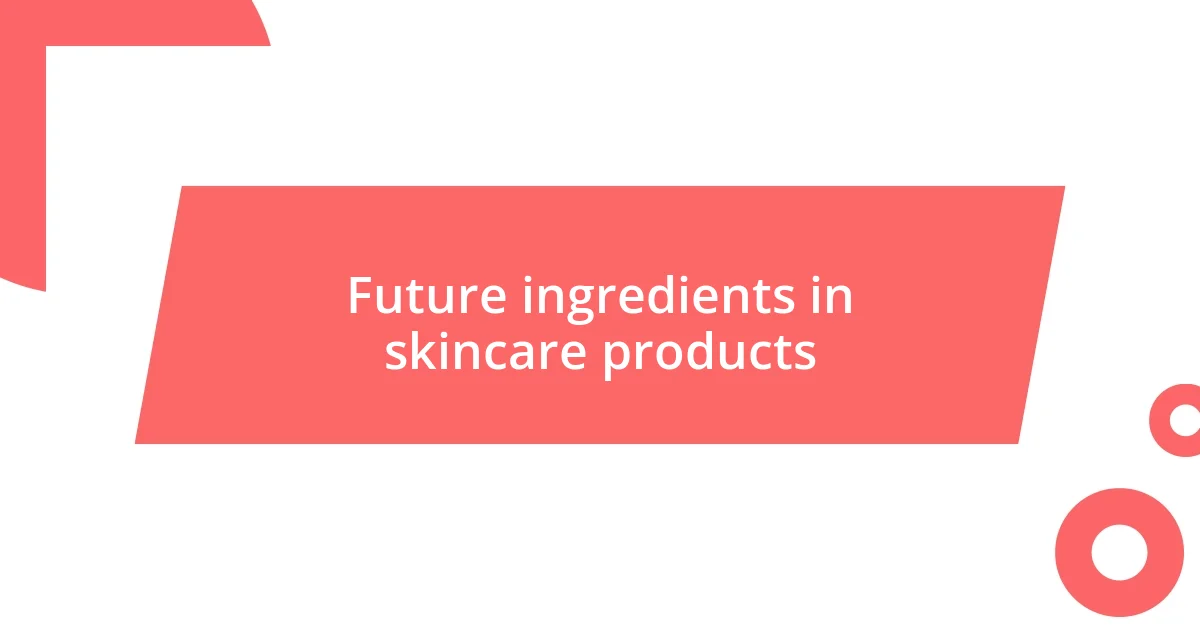
Future ingredients in skincare products
One of the most exciting trends I hope to see in future skincare products is the incorporation of lab-grown ingredients. Imagine applying a serum made with bioengineered collagen or hyaluronic acid that’s sustainably sourced and tailored to your skin’s unique needs. I remember the first time I heard about personalized skincare; it felt revolutionary, and now it seems like we’re on the brink of making it a reality.
Another ingredient that piques my interest is adaptogens. These powerful plants help us adapt to stress and can provide a calming effect on the skin. I’ve personally experienced how soothing ingredients can transform my routine. Have you ever used a product infused with ashwagandha or rhodiola? Their ability to balance and nourish really makes me hopeful about the future of skincare.
Lastly, I’m fascinated by the potential of ferment-derived ingredients. Fermentation not only enhances the bioavailability of nutrients but also promotes a healthy skin barrier. I once tried a ferment-based essence, and it felt like a drink of water for my skin! Don’t you ever wonder how much more we could unlock from nature by exploring these processes? The future is bright with these innovations!
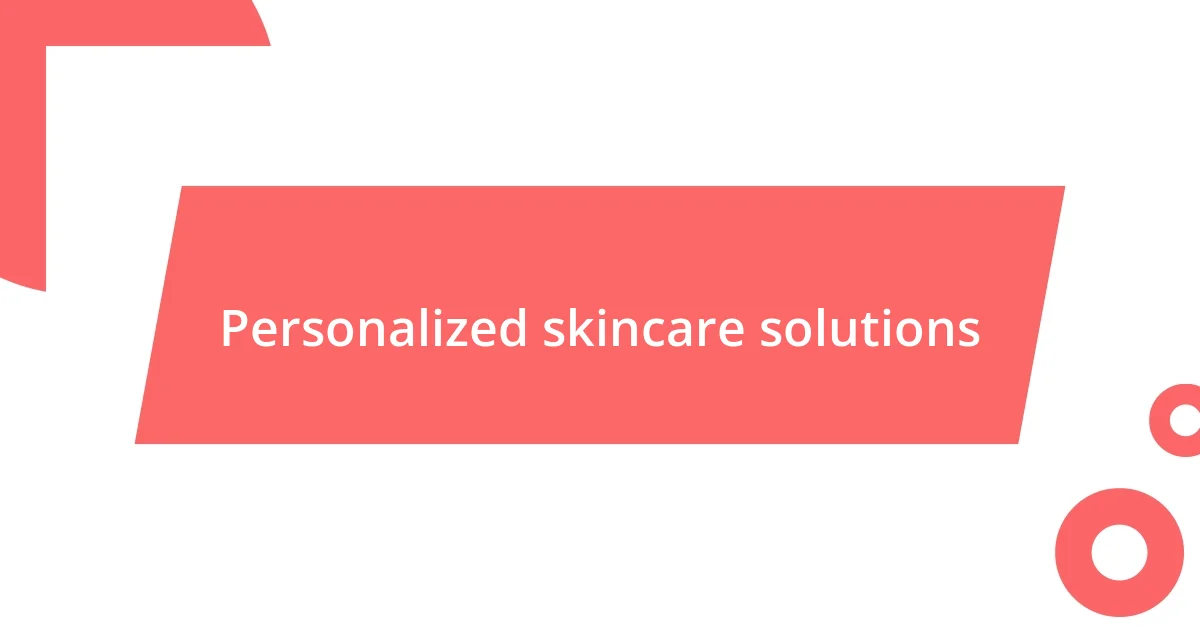
Personalized skincare solutions
When I think about personalized skincare solutions, I become genuinely excited. Tailoring products specifically for our unique skin profiles could revolutionize our beauty routines. Just imagine receiving a skincare regimen that adapts as your skin changes—like a virtual skincare consultant that knows you inside and out. I’ve had my share of trial-and-error with products that weren’t quite right, and the idea of a customized routine feels like a dream come true.
- DNA analyses to identify unique skin needs
- AI-driven consultations that adjust recommendations in real-time
- Custom formulations based on environmental factors like weather and pollution
- Subscription services that deliver targeted products periodically
Now, consider that feeling of receiving a product that was made just for you. I once tried a bespoke moisturizer crafted after a thorough skin analysis. The way it felt on my skin—light yet deeply hydrating—was an experience I’ll always remember. The emotional connection to a truly tailored product has the potential to elevate our routines from mundane to extraordinary. Personalized skincare isn’t just about efficacy; it’s about feeling seen and valued in a world overflowing with options.
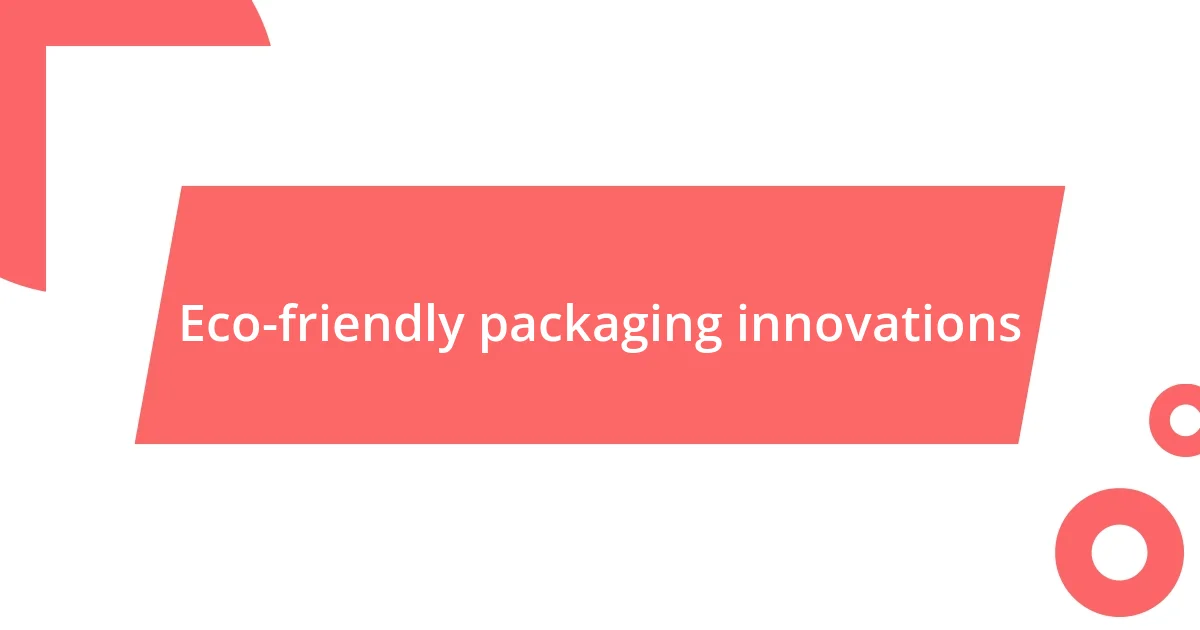
Eco-friendly packaging innovations
In my quest for sustainability, eco-friendly packaging innovations stand out as a crucial aspect of future skincare products. Think about how often we toss aside those heavy glass jars or excessive plastic containers. Personally, I’ve made it a mission to seek out brands that embrace minimalist, biodegradable, or refillable options. For instance, I remember discovering a skincare line that offered refillable tins. Not only did it make me feel like I was actively contributing to a healthier planet but using those tins added a touch of charm to my routine.
Another exciting trend is the use of plant-based materials designed for packaging. Imagine unboxing a new moisturizer nestled in packaging made from mushroom mycelium or cornstarch. This resonates with me deeply, as my goal is to lessen my impact on the environment. The thrill of knowing that what I’m using can decompose naturally and won’t linger in a landfill is incredibly satisfying. Have you considered how much waste could be reduced if these innovations became the norm in our beauty regimes?
Lastly, I find it inspiring when brands incorporate post-consumer recycled materials in their packaging. I once purchased a serum that came in a bottle made from 100% recycled plastic. The pride I felt upon knowing that I was supporting recycled materials—and that I wasn’t just buying another brand-new plastic item—was empowering. Our beauty choices can echo with purpose, creating a ripple effect in the industry, making sustainability not just an option, but a standard. Isn’t it wonderful to think about how such choices could reshape not just our skincare, but our entire consumption landscape?
| Type of Packaging | Benefits |
|---|---|
| Biodegradable | Reduces landfill waste and aids in environmental restoration |
| Refillable | Encourages continued use and minimizes single-use waste |
| Recycled Materials | Utilizes existing materials, reducing the need for new resources |
| Plant-based Materials | Natural decomposition, contributes to sustainable practices |
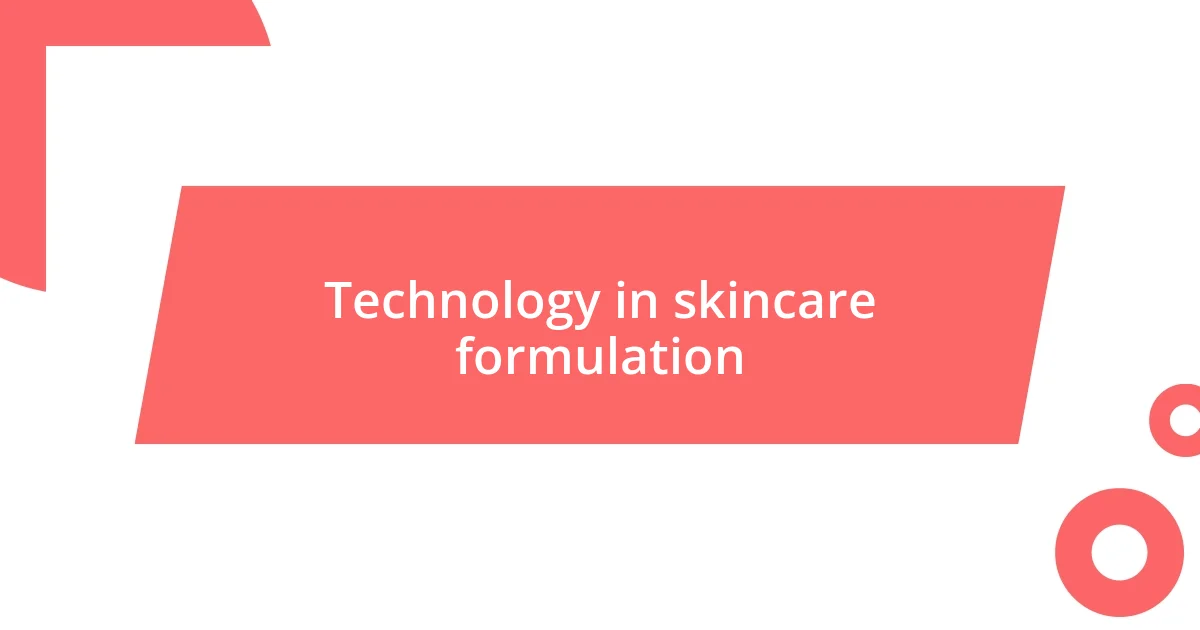
Technology in skincare formulation
When I delve into the world of technology in skincare formulation, I’m genuinely amazed at the advancements. The integration of AI and machine learning into product development is especially intriguing. It’s fascinating to think that algorithms can analyze skin types and environmental factors, allowing brands to create formulations that adapt and perfectly suit our individual needs. Have you ever experienced the moment when a product just clicks with your skin? I have, and it makes all the difference.
I recall a time when I was introduced to a serum developed using cutting-edge nano-technology. It promised deeper penetration of active ingredients than traditional formulations. Upon trying it, I was blown away by how quickly my skin absorbed it, leaving no greasy residue. I felt like I had stumbled upon a little piece of skincare magic! It made me wonder: what other wonders could technology bring to our beauty routines?
Moreover, the potential for augmented reality (AR) in skincare truly excites me. Imagine using AR to visualize how different products might perform on your skin before making a purchase. This kind of tech could greatly reduce buying mistakes, something I’ve certainly encountered when chasing the latest skincare fads. The idea of virtually “trying on” products feels empowering—it’s about making informed decisions rather than blind leaps of faith. Isn’t it thrilling to think about how technology can transform not only our routines but also the way we perceive the products we apply?
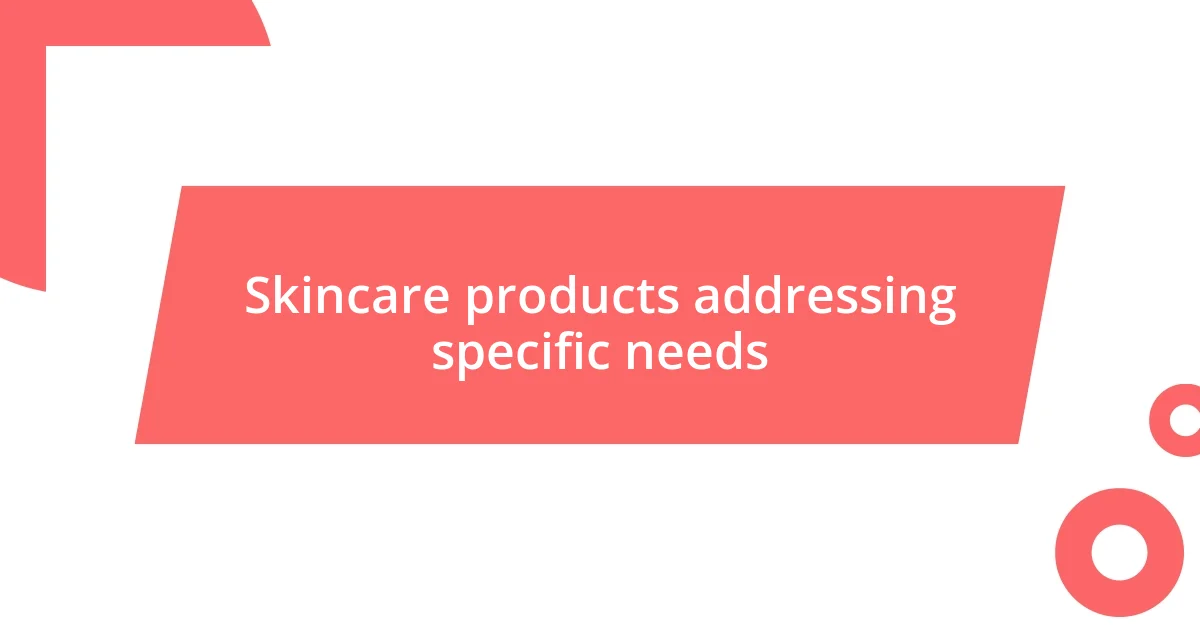
Skincare products addressing specific needs
Skincare is not a one-size-fits-all world. I’ve often found that my skin’s needs can vary drastically based on factors like season, stress levels, or even diet. I recall when my skin went through a particularly dry phase during a harsh winter. It was a revelation to discover products specifically formulated to hydrate and restore barrier function. This experience made me realize the importance of skincare products that target specific issues—like breakout-prone areas or hyperpigmentation—rather than generic solutions that may not address my exact needs.
I also appreciate brands that highlight unique ingredients tailored to specific concerns. While browsing my favorite beauty aisle, I stumbled across a range featuring the benefits of bakuchiol, a natural alternative to retinol. I remember feeling a wave of excitement when I realized that this gentle formulation addressed my fine lines without the irritation that retinol often induces. Have you ever felt that spark when you find a product that seems like it was crafted just for you? It truly makes the entire shopping experience worthwhile when a product addresses a specific skin concern.
Additionally, customized skincare solutions pique my curiosity. The concept of brands offering formulations designed after a quick quiz or a skin analysis resonates with me. I recently tried a service that recommended products based on an online questionnaire. The moment I used the personalized moisturizer, I could feel the difference—it was as if the product was made with my skin in mind. Imagine if this trend expanded, leading to unique, tailored skincare routines that consider our individual lifestyles and needs. Wouldn’t it be fantastic to embrace products that genuinely understand us?
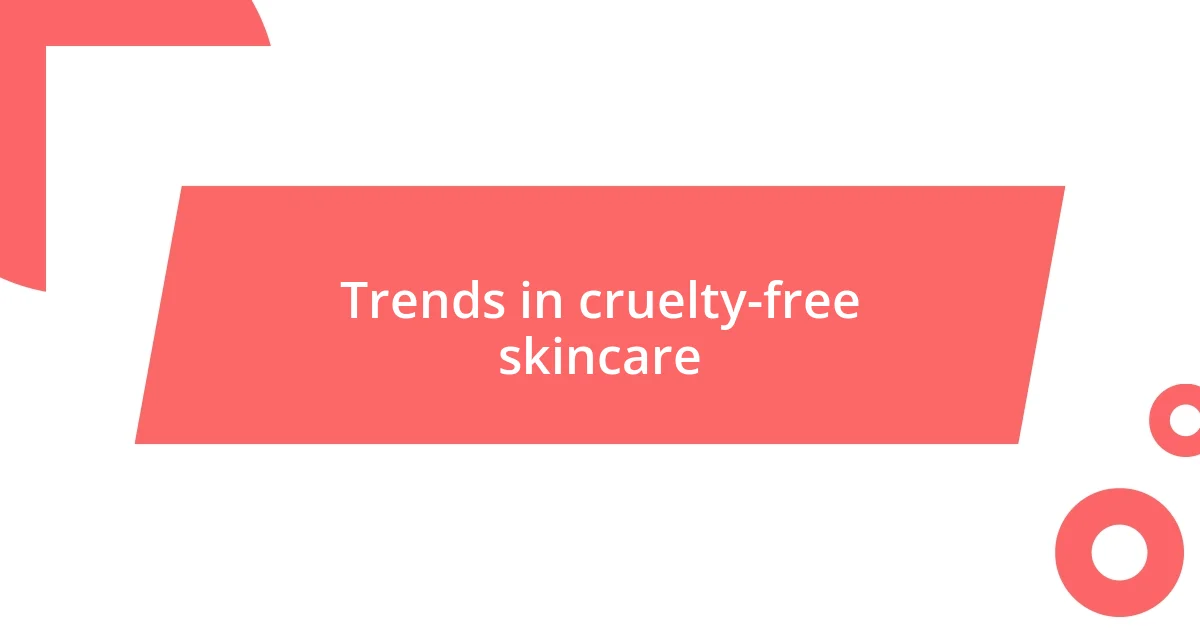
Trends in cruelty-free skincare
The rise of cruelty-free skincare is not just a trend; it’s becoming a movement. I’ve often noticed how passionate consumers are about supporting brands that prioritize ethical practices. Recently, I was drawn to a new line of products that proudly displayed their cruelty-free certifications. It felt good to know that my purchase was supporting a kinder approach to beauty, and it’s empowering to see more brands stepping up.
I also find myself intrigued by the emphasis on transparency in cruelty-free skincare. Brands are starting to share their sourcing stories, detailing how their ingredients are not only cruelty-free but also sustainably harvested. When I learned about a company that partnered with local farmers for their botanicals, I felt a stronger connection to the product. It makes me wonder: how can we cultivate a deeper relationship with skincare, one that respects both our values and the planet?
Moreover, the innovation around vegan formulations in skincare excites me. Not too long ago, I tried a vegan moisturizer that completely changed my perspective. The texture was beautiful and creamy without any animal derivatives, and my skin felt nourished without the heavy feeling I often associate with similar products. It’s moments like these that make me question our previous norms in the industry. How did we manage all this time without these alternatives? The future of cruelty-free skincare looks bright, and I can’t wait to see where it leads next.









